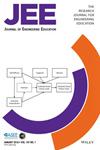Systematic literature review of the factors influencing development of engineering education researchers
Abstract
Background
Given the increasing number of researchers engaging in engineering education research (EER) globally, there is intensifying interest in researcher development.
Purpose
This study systematically reviewed the literature guided by the research question: “What are the key factors and how do they influence the development of engineering education researchers?” The review aimed to contribute practical recommendations for enhancing engineering education researcher development and suggest future research directions.
Scope/Method
Database search with the application of screening criteria and a quality assessment resulted in 49 papers being included in the systematic review.
Results
Mapping the context of included papers showed that scholarly activity was increasing over time, that research on participants operating outside of the United States and Australia was underrepresented, and that studies were dominated by qualitative approaches applied to small sample sizes. The key factors influencing engineering education researcher development aligned to the following themes (and subthemes indicated in brackets): environment (funding, employment context, and recognition of impact); community (socialization and collaboration); knowledge acquisition (development pathways and engaging in a new research paradigm); and personal attributes (motivation and identity transition).
Conclusions
Recommendations are made for enhancing engineering education researcher development for researchers, EER leaders, and institutional leaders. Future research should seek to examine development experiences in a wider range of national contexts, ask more questions aligned to the size and significance of phenomena that require greater implementation of quantitative methods, and ask more comparative research questions that can foster understanding of what strategies have the greatest impact according to individual circumstances.


 求助内容:
求助内容: 应助结果提醒方式:
应助结果提醒方式:


